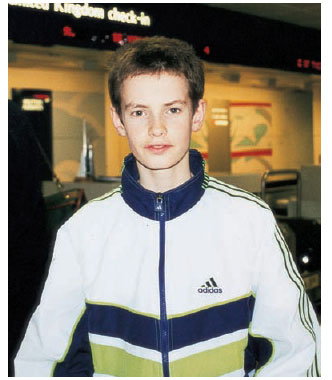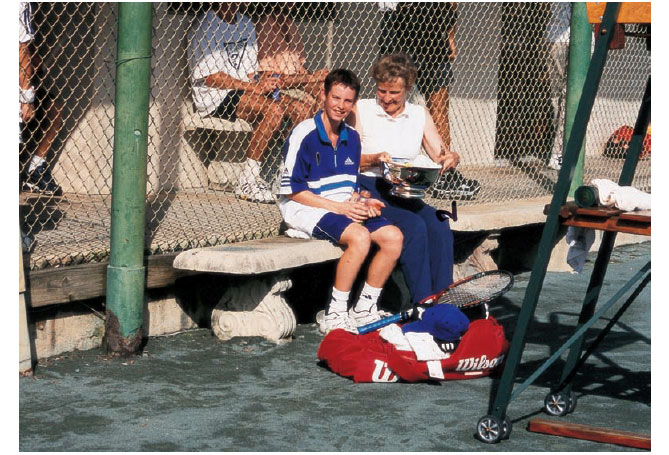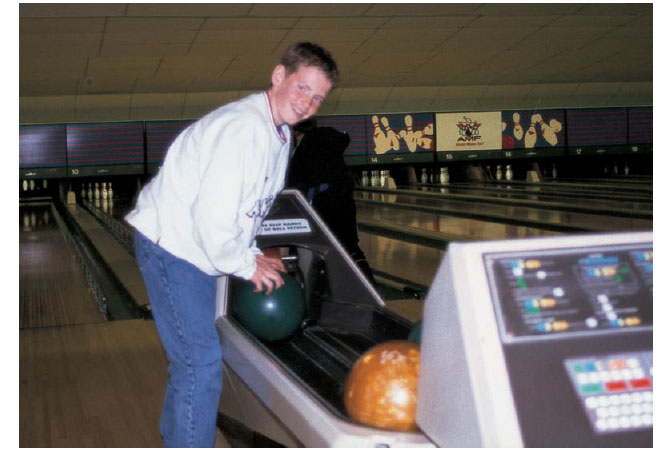Authors: Andy Murray
Hitting Back (9 page)
With mum and Jamie at
the tennis club aged nine

About to take
off on another overseas
trip aged eleven

Looking
good in my new Adidas
tracksuit aged eleven

Me and my gran with my Orange
Bowl Trophy in December 1999.
She never did give it back!

Orange Bowl Champion

With my coach Leon Smith

Grinding it out at the National 14U
Championships in Nottingham, 1999
(
Inset)
School photo –
First year at Dunblane High

My eleventh birthday bowling party with Jamie and some pals,
followed by McDonald's. Pretty sure I won

The 100 Club
I almost didn't make the 2004 Sports Personality of the Year
show because I was stuck in a toilet. This is true. It was hardly
the most glamorous start to my celebrity life. I was due to pick
up the award for Young Personality of the Year – Wayne
Rooney had won it the year before – and within about an hour
of show starting I was stuck in a hotel bathroom behind a door
that was completely jammed. My friend was trying to prise it
open from the other side with a two-pence piece. He couldn't
do it. He called reception and a guy came up with a wrench
and he couldn't do it either. Obviously we were laughing at the
start but gradually it didn't seem so funny.
On top of that, we were already late. I had been playing in a
Futures event final in Spain that afternoon. Within seconds of
the match finishing – I won – I had to rush for the airport with
two huge bags and jumped on a plane. It was a tiny local
airport in the north of Spain and the tournament director had
to phone to ask them to hold the flight for me. I only just made
it and when I got to Heathrow I somehow managed to come
out of Terminal 1 instead of 2 where my mum and an old pal,
Matt Brown, were waiting for me. By the time I found them
and was escorted back into Terminal 2 by airport security to
reclaim my bags, it was already 5pm and we had to be at the
BBC Centre for 7pm. We took a cab to the hotel, grabbed
something to eat and went up to the room to get ready.
I went for a quick shower, put my suit on – no cufflinks!
Had to call down to the concierge and borrow a pair. Went
back into the bathroom for a final brush of my teeth and
couldn't get out! I was stuck in there for about twenty minutes,
sweating buckets, before the guy from reception went away,
came back with a knife and finally opened the door. I flew out,
leapt in a cab and made it just in time.
It was pretty cool but also quite nerve-racking to receive my
award from Boris Becker. I tried to remember all the advice I'd
been given, like 'Don't chew gum!' because that had been
Wayne Rooney's problem the year before. I had to do this
speech in front of all the best sports people in Britain and I was
really young at the time. So I played it straight, no jokes, and
it went pretty well. Or so I'm told.
Afterwards I met Chris Eubank who was wearing a top hat
and carrying a cane. Being a massive boxing fan, I was loving
that. I met Sir Clive Woodward. Kelly Holmes was there. I
remember laughing at Matt snapping everyone and anyone
with his throw-away camera! The best thing, though, was
being out of the toilet. It occurred to me that I was probably
the only winner there who had just been sprung from a toilet
but I didn't mention that at the time.
Maybe that wasn't the ideal way to turn the year, but at least
I was now a tennis player ranked 411 in the world, with a
couple of sponsorship deals, thanks to the US Open Junior win,
and every intention of going up the rankings by a long way. I
actually said in an interview with the BBC that by the end of
2005 I wanted to be in the top-100. A few people said: 'He
should keep his mouth shut. He's got a long way to go.'
Perhaps that was a bit precocious. I wasn't the world's best
junior, I had never played in an ATP event, I had won four
Futures events (the lowest tier of senior tennis) but had not
even reached the quarter-finals of a Challenger (the next tier
up) since 2003. Put it this way, Roger Federer was not exactly
quaking at the thought of meeting me.
I could not possibly have known that by the end of the year
I would play Federer in my first ATP event final, beat Tim
Henman in Switzerland, cause 'P-Andymonium' at Wimbledon
and become the youngest Briton ever to play in the Davis Cup.
I could not even have imagined that, because the start of 2005
was horrible.
My coach, Pato Alvarez who worked at the Sanchez-Casal
Academy, had this plan. He was sure I could reach the World
Top-50 pretty quickly and he wanted me to play in the qualifying
events for a few Challengers in South America to get there.
He kept saying, 'You have to learn how to play at the next
level, the Futures level is very, very bad.' That meant winning
matches and I was losing them instead. I was playing badly. I
had a growth spurt which caused problems with my back. It
was a horrible run and I was losing early in loads of
tournaments. I struggled for two months, finding the step up to
Challengers, even qualifying for Challengers, really difficult.
In the middle of this, I suddenly received a wild card for my
first full ATP event, the tournament in Barcelona. I think
Emilio Sanchez has contacts with the tournament and he
probably swung it for me. I should have been intimidated, yet
for some reason, I managed to feel quite confident. I don't
really understand why except it felt like playing on home
ground with all my friends from the Academy coming to
watch. Obviously I was really nervous, but I was able to practise
with the Spanish players, including Juan Carlos Ferrero,
who were already on the tour. It was the first time I had been
able to hit with players of that level for three or four days in a
row. Instead of making me more worried, it actually boosted
my confidence. This was my chance to play in front of a decent
crowd for a decent amount of money against decent opposition.
My first opponent was Jan Hernych, a 25-year-old
Czech player who was ranked 67 in the world. I suppose I
should have been intimidated, but my mum sent me a scouting
report the night before telling me how he played, and saying
that my gran was a better volleyer than him.
I was so close to winning that match. I should have won. I
had chance after chance. I had something like 18 break points
but only converted about three. I was a break up in the third
set but eventually lost 3–6 6–4 6–4. Looking back, I think I
played pretty well, but at the time I was furious. I came off the
court snarling: 'That was a terrible, terrible performance from
me.' I felt I'd let him off the hook, having twice been within a
point of a 4–1 lead in the final set. I had expected to win. I
didn't think he was anything special as a player, despite being
seven years older than me and ranked over 300 places higher.
I was totally frustrated.
Later, when I calmed down and looked back on that day, I
could see that the match had helped me a good deal. I had
played in an ATP tournament and I had not felt out of place. I
knew from that moment on that I could definitely reach the
World Top-100. That had been my dream. Now it was my
goal.
But first I had to resolve an ongoing problem with Pato as
my coach. It had degenerated into a difficult relationship.
When I met him at the Academy, he struck me as a really
friendly, nice guy. He used to bring us sliced oranges that we
would eat by the side of the court while we were training. He
was famous for having coached about forty guys who reached
the top-50, including Ilie Nastase, and he is credited with being
one of the main reasons behind the turn around in Spanish
tennis in the last twenty years. They called him 'El Guru del
Tenis'.
There is no doubt he was hugely knowledgeable and I know
I learned loads from him, but by now he was a 69-year-old
man and I was a 17-year-old boy and maybe the numbers just
didn't add up. It was a bit like being with a grandparent. Also,
I wasn't always travelling individually with him. Usually, I was
with a small group of players – three or four of us would go to
tournaments together – and I was at the stage where I felt I
needed a little bit more individual coaching. I wasn't particularly
happy. I seemed to need someone to pick me up more.
And, I'd been in Spain going on for three years. The training
was great, but it was becoming very repetitive. Barcelona had
been good for me, but it was time to leave.
I looked at myself pretty ruthlessly. I basically had no
variation in my game. I was playing the same way as all the
other guys around my ranking. Yet I wasn't as fit, nor as
experienced as them and, mentally, I wasn't as strong. I was
losing a lot of matches. I needed a change and wanted to play
my own game.
At first, the separation was uncomfortable. I remember
spending my eighteenth birthday at a Challenger in Germany
on my own. It was probably the first birthday in my life when
I hadn't seen anyone from my family. I was struggling, but I
didn't give up and it wasn't long before I managed to turn it
around.
My mum came over to be with me when I played in the
French Open Juniors in Paris, my first grand slam since
becoming the US Junior Champion. I was ambitious for the
tournament. I wanted to prove I could perform on clay as well
as hard courts. I felt well and determined. Then I got food
poisoning the night before the tournament started. I was
running to the toilet every twenty minutes before my game
against Piero Luisi of Venezuela in the first round but,
fortunately, the problem eased and when I beat the highly-rated
Argentinian Juan-Martin Del Potro in straight sets in the
quarters, I felt pretty happy. I even gave a press conference
afterwards and we had a laugh about a streak of blood on the
court that I left from scraping my knuckles. I thought it added
to the scene of battle.
If tennis teaches you anything, it is that your mood can
change overnight. My semi-final was against Croatia's Marin
Cilic, who went on to be the number two junior in the world,
and suddenly everything was rubbish again. It had been raining
and our match was switched to one of the smaller show courts
where the wind was swirling and making it difficult to get into
a rhythm. I was furious at blowing a lead to lose the first set
and smashed a couple of rackets on the court. The frustration
was getting to me so badly that at one point I just yelled: 'What
are you
doing
, Andy?'
I tried not to make any excuses afterwards. I had been
playing doubles with my friend Andrew Kennaugh late into the
night before, which might have affected me, but I was still
furious with myself. Then I tried to be more rational. Losing
here was just giving me more time to get used to grass. I felt I
could do well at Queen's, then Nottingham and maybe even at
Wimbledon. It didn't daunt me. I don't know why I thought
that. I just did.
I went into Queen's Club unknown, unseeded, and pretty
anonymous except to my family and my dog. I came out of
Wimbledon four weeks later and everyone seemed to know
who I was. I felt exactly the same person, but the way I was
treated was suddenly very different. Just to prove it, the ATP
tournament at Newport, Rhode Island, offered me a wild card
as a kick-start to my American hard-court tour. Of course, I
said yes, and – not for the first time – I then found myself in
trouble.
The tournament is really nice but the grass courts there are
terrible. Everyone knows that. Unfortunately, not everyone
says so in their press conference after the game. I did. I said
they were the worst tennis courts I'd ever played on, which
probably wasn't the most tactful thing to say after the tournament
had been kind enough to give me a wild card. But, it was
what I felt.
It was a fair indication of how much they cared about the
surface when the tournament director and the players joined in
a massive game of whiffleball, like baseball only with a lighter
ball, on the courts during the player party. We were sliding into
bases and everything. Can you imagine the groundsman at
Wimbledon letting you do a thing like that? It was pretty
funny, in a way.
Something always seems to happen to me at Newport. The
following year, I received a point penalty for losing my temper
during a match. That's the only point penalty I've ever had.
Back in 2005, though, I scuffed my way into the second round
and then came up against a Frenchman called Antony Dupuis
who I should have beaten comfortably even though he was
ranked 111. But it had rained. The courts were so soft and the
bounces were so low, I couldn't find any rhythm. I was
struggling big time and getting very frustrated. Having done
quite well at Wimbledon this was ugly tennis.
My language was OK but I thumped a ball into the crowd
and hit my racket into the court where it made a huge mark
because the surface was so soft. Whenever the press compile
lists of my 'bad moments', Newport 2005 and 2006 often get
a mention. In 2007, I had to miss the tournament due to my
wrist injury and I expect the organisers were really relieved.
That was just the beginning of the American adventure. I
looked ahead at six more tournaments, plus the US Open
where I would be playing the senior event for the first time.
Mark Petchey and I were road buddies, now that he'd been
confirmed as my coach. I hoped I could afford him. Money is
not the reason you play tennis, but it certainly helped when my
prize money began to outstrip my expenses for the first time. I
used to be afraid of checking out of hotels in case my prize
money didn't cover it. Budgets were really tight. At least eating
cheap food wasn't a problem because I didn't know what
expensive restaurant food tasted like. When I reached the semifinals
of the French Open Juniors, it was mostly on a diet of
baguettes and chocolate spread.
I don't know how many thousands of miles we did on our
American tour, but the next stop was Aptos, California right
across the country. Tony Pickard would have been pleased. At
last I was back on the Challenger circuit. All the press had gone
and now I was back playing again where I deserved to be in
front of fifteen, maybe twenty, people. I wasn't even living in a
hotel. Mark and I were staying with a family, and their dog,
and we had one room, with a dartboard. We played a lot of
darts that week.
I played quite a bit of tennis too, winning my first Challenger
when I had never previously been beyond the quarter-finals.
The prize money was over $10,000. That was a handy amount
to put away. Next up was Indianapolis, a $500,000 ATP event
that I entered with a wild card. I won a round there which did
my confidence good (prize money $5,225) and then we went
on to a little $75,000 tournament in Granby, Canada (where I
won $1,460), followed by a flight across the continent to
Vancouver for a $100,000 Challenger in one of the nicest cities
I have ever been to.
